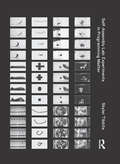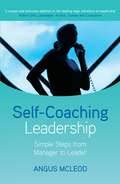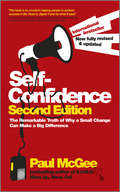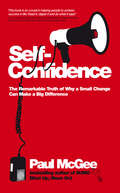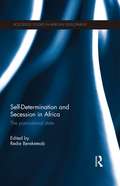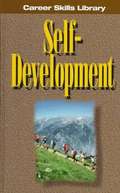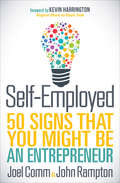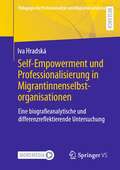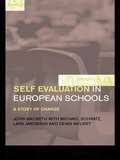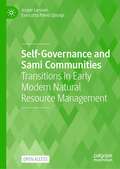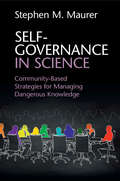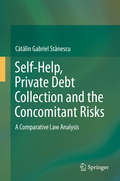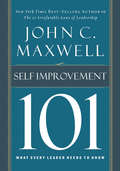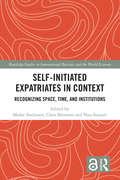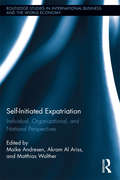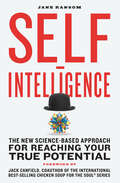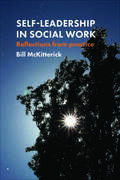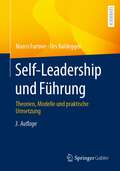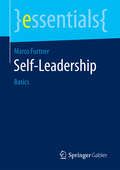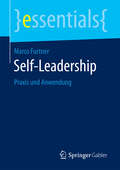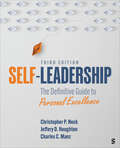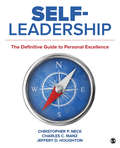- Table View
- List View
Self-Assembly Lab: Experiments in Programming Matter
by Skylar TibbitsWhat if structures could build themselves or adapt to fluctuating environments? Skylar Tibbits, Director of the Self-Assembly Lab in the Department of Architecture at MIT, Cambridge, MA, crosses the boundaries between architecture, biology, materials science and the arts, to envision a world where material components can self-assemble to provide adapting structures and optimized fabrication solutions. The book examines the three main ingredients for self-assembly, includes interviews with practitioners involved in the work and presents research projects related to these topics to provide a complete first look at exciting future technologies in construction and self-transforming material products.
Self-Coaching Leadership
by Angus I. McleodGenerally, leadership is about influencing people to make big things happen. Management is a process of organizing people to get things done. They are different skills, but equally critical to success in today's workplace. The key is to know which approach works best in which situation.Written in a clear, simple style, Self-Coaching Leadership redefines and demystifies the journey to leadership. Angus McLeod's no-nonsense thinking, straightforward approach and practical tools enable readers to more easily identify when a leader is needed - and coach themselves toward improved influence, performance and effectiveness.
Self-Confidence
by Paul McgeeThe new edition of the personal development classicThis long-awaited second edition gives us even more of Paul McGee's unique look at boosting our confidence - with his much-loved wit and good humour. The new edition includes a brand new chapter and a host of new exercises.Paul's approach to confidence is different. According to Paul, we don't have to raise our self-confidence to the roof; just increasing our confidence by a small amount can dramatically change our lives. Paul explains exactly what confidence is, why it's so important and just how to develop it in ourselves and others. This honest, practical and realistic book covers:Confidence in business Being more confident in your love life Confidence in social situations Confidence in job interviews and presentations A brand new chapter on handling conflict confidently Experiences from real people who have followed Paul's advice and improved their lives
Self-Confidence: The Remarkable Truth of Why a Small Change Can Make a Big Difference
by Paul McGeeA bestselling motivational author on life's X factor: confidence. Have you ever wondered how different your life would be if you increased your confidence by just 10%? Paul McGee has. And in his latest book, he explains what confidence is, where it comes from, why it's important, and how to develop it in yourself and others. Not only does the book deal with confidence in business, romance, social situations, and all areas of life, it explodes common myths, including why 'over-confidence' and 'under-confidence' are both harmful. Loaded with practical tips on bouncing back from a setback and feeling confident in challenging situations, this inspiring, upbeat book will help fill you with life's X factor. Full of practical tips on feeling confident during job interviews, presentations, networking, and social gatherings Written by Paul McGee, bestselling author of S.U.M.O. (Shut Up, Move On) and S.U.M.O. Your Relationships With this indispensable guide, you'll not only learn how to feel confident, but turn confidence into meaningful life-changing action.
Self-Determination and Secession in Africa: The Post-Colonial State (Routledge Studies in African Development)
by Redie BereketeabThis book provides a unique comparative study of the major secessionist and self-determination movements in post-colonial Africa, examining theory, international law, charters of the United Nations, and the Organisation of African Unity (OAU)/African Union’s (AU) stance on the issue. The book explores whether self-determination and secessionism lead to peace, stability, development and democratisation in conflict-ridden societies, particularly looking at the outcomes in Eritrea and South Sudan. The book covers all the major attempts at self-determination and secession on the continent, extensively analysing the geo-political, economic, security and ideological factors that determine the outcome of the quest for self-determination and secession. It reveals the lack of inherent clarity in international law, social science theories, OAU/AU Charter, UN Charters and international conventions concerning the topic. This is a major contribution to the field and highly relevant for researchers and postgraduate students in African Studies, Development Studies, African Politics and History, and Anthropology.
Self-Development Skills
by Dandi Daley MackallThe Career Skills Library describes the skills, traits, and attributes that are crucial to success in any field. This series details the competencies identified by the Department of Labor's SCANS (Secretary's Commission on Achieving Necessary Skills) as essential to solid job performance. Each book focuses on one of these skills in the workplace and shows how students can improve that skill while still in school. Self-Development -- Examine traits like dependability, integrity, and honesty that will help you succeed in all areas of your life.
Self-Diagnosis: Do You Have the Right Stuff to Start a Business?
by Richard LueckeIdeas are an important element of success for entrepreneurs, but they're not as important as personal background, motivation, and attitude. In discussing the traits that research has defined as essential to success and the tests that are available for judging suitability, this chapter helps you determine whether you have the makings of a business entrepreneur.
Self-Employed: 50 Signs That You Might Be an Entrepreneur
by Joel Comm John RamptonTwo successful entrepreneurs offer a no-nonsense guide to the qualities that make people suited to starting their own businesses. In today&’s world of startup companies, entrepreneurs are disrupting industries and fueling the economy like never before. It&’s an exciting life where no day is quite like the next. But along with the adventure comes a lot of uncertainty, and not everyone is suited to the entrepreneurial life. So, what does it take? In Self Employed, Joel Comm and John Rampton detail 50 different qualities found in people who could do well as entrepreneurs. Having started, managed, and sold several multimillion-dollar businesses, Comm and Rampton understand what it takes to succeed in this highly competitive realm. The 50 qualities they outline provide a framework for anyone to decide if they might make it in business on their own. If you&’re wondering whether the entrepreneurial lifestyle is right for you, or you want to know for sure that the business you&’ve already started is suited to your temperament, this book is for you!
Self-Empowerment und Professionalisierung in Migrantinnenselbstorganisationen: Eine biografieanalytische und differenzreflektierende Untersuchung (Pädagogische Professionalität und Migrationsdiskurse)
by Iva HradskáDas Forschungsinteresse dieser Studie richtet sich auf das Zusammenspiel von Biografie und Professionalisierungsprozessen von Akteurinnen in Migrantinnenselbstorganisationen (MSO) bei der Ausübung ihrer Bildungs- und Beratungsarbeit. Es werden drei Fallanalysen mit markanten Innenansichten präsentiert. Als Ergebnis werden drei Muster vorgestellt, die auf unterschiedliche Herstellungsprozesse biografischer Passungsverhältnisse individueller undorganisationaler Professionalisierung und Self-Empowermentstrategien der Akteurinnen verweisen. Die Muster zeigen, dass die Akteurinnen eine bestehende dynamische Wechselbeziehung zwischen der ausgeübten Tätigkeit und den Interaktionsressourcen aus ihren Migrationsbiografien zu nutzen und individuelle Lösungs- und Bewältigungsstrategien bei der Professionalisierung und Etablierung der MSO anzuwenden vermögen. Die priorisierten Zielverständnisse ihrer Tätigkeit unterscheiden sich entlang der drei ausgearbeiteten Muster: die Möglichkeiten die gesellschaftliche Partizipation von Migrantinnen zu erhöhen, Selbstverwirklichung der Migrantinnen zu unterstützen und migrations- und geschlechtsbezogene Exklusionsprozesse zu minimieren.
Self-Evaluation in European Schools: A Story of Change
by Michael Schratz John MacBeath Lars Jakobsen Denis MeuretIn a political and economic climate in which school performance is made public, performance tables and inspectors' reports can only tell a partial story.This is a unique book. It tells the story of one school seen through the eyes of a pupil, a parent, a teacher, a headteacher and a critical friend. The story is a compelling journey through the process of school improvement; theories of school effectiveness and school improvement are progressively clarified.This book is based on a well-known and well-documented research project that represents eighteen European countries, which clearly sets it in a European Policy context. It includes a wealth of practical tools for raising standards for teachers and school managers to refer to, and guidance on how to use them.This eagerly awaited follow-up to Schools Must Speak for Themselves by John MacBeath (RoutledgeFalmer 1999) is a vital and useful source of good ideas, challenging insights and practical strategies for real schools.
Self-Governance and Sami Communities: Transitions in Early Modern Natural Resource Management
by Jesper Larsson Eva-Lotta Päiviö SjaunjaThis open access book uses an interdisciplinary approach that not only focuses on social organization but also analyzes how societies and ecological settings were interwoven. How did early modern indigenous Sami inhabitants in interior northwest Fennoscandia build institutions for governance of natural resources? The book answers this question by exploring how they made decisions regarding natural resource management, mainly with regard to wild game, fish, and grazing land and illuminate how Sami users, in a changing economy, altered the long-term rules for use of land and water in a self-governance context. The early modern period was a transforming phase of property rights due to fundamental changes in Sami economy: from an economy based on fishing and hunting to an economy where reindeer pastoralism became the main occupation for many Sami. The book gives a new portrayal of how proficiently and systematically indigenous inhabitants organized and governed natural assets and how capable they were in building highly functioning institutions for governance.
Self-Governance in Science: Community-Based Strategies for Managing Dangerous Knowledge
by Stephen M. MaurerCommercial and academic communities use private rules to regulate everything from labor conditions to biological weapons. This self-governance is vital in the twenty-first century, where private science and technology networks cross so many borders that traditional regulation and treaty solutions are often impractical. Self-Governance in Science analyzes the history of private regulation, identifies the specific market factors that make private standards stable and enforceable, explains what governments can do to encourage responsible self-regulation, and asks when private power might be legitimate. Unlike previous books which stress sociology or political science perspectives, Maurer emphasizes the economic roots of private power to deliver a coherent and comprehensive account of recent scholarship. Individual chapters present a detailed history of past self-government initiatives, describe the economics and politics of private power, and extract detailed lessons for law, legitimacy theory, and public policy.
Self-Help, Private Debt Collection and the Concomitant Risks
by Cӑtӑlin Gabriel StӑnescuThe book shows that self-help in commercial law is a fast, inexpensive and efficient alternative to court enforcement. Self-help remedies and private debt collection are largely but not exclusively features of common law jurisdictions, since remnants of private enforcement can still be found in contract law in civilian systems. The book argues that - despite their usefulness - self-help and private debt collection entail significant risks, especially for consumer debtors. This means that private enforcement needs to be accompanied by the introduction of tailor-made consumer-debtor protection regulation. Specific attention is given to factoring, which functions in many instances as a form of pseudo-private debt collection and which has been exploited to bypass sector-specific consumer protection regulations.
Self-Improvement 101: What Every Leader Needs to Know
by John MaxwellTo improve your life, improve yourself.New York Times best-selling author John C. Maxwell asserts, "Most people don't realize that successful and unsuccessful people do not differ substantially in their abilities. They vary in their desire to reach their potential. The way they reach that potential is through commitment to personal growth." Self-Improvement 101 provides the essentials leaders need to keep striving for excellence no matter where they are or what they are doing. Some lessons you will learn from Dr. Maxwell's decades of experience:The secret of becoming a lifelong learnerWhere to focus your time for maximum growthWhat sacrifices are worth making to keep getting betterHow to overcome obstacles to self-improvementThe key to turning experience into wisdomLeaders are learners.People never reach their potential by accident.
Self-Initiated Expatriates in Context: Recognizing Space, Time, and Institutions (Routledge Studies in International Business and the World Economy)
by Maike Andresen; Chris Brewster; Vesa SuutariThis edited volume builds on the previously published Self-Initiated Expatriation: Individual, Organizational, and National Perspectives, which served to give in-depth insights into the concept and the processes of self-initiated expatriation and presented different groups undertaking self-initiated foreign career moves. While more than a hundred articles on self-initiated expatriation (SIE) have been published in the meanwhile, an examination of the research questions and samples of SIEs in published SIE research shows that the role of context and its impact on SIEs’ career-related decisions and behaviors has not been explored sufficiently. This raises the question in how far existing research results are comparable. The aim of this follow-up volume is to deepen the understanding of SIEs’ careers, focusing on the contextual influences of space, time, and institutions on the heterogeneous SIE population. More specifically, the editors aim to shed light on spatial conditions in terms of the home and host country conditions on the self-initiated expatriation experience and examine developments over time in terms of temporality of conditions and SIEs’ life-course. Moreover, the influence of the institutional context in terms of occupational, organisational, and societal specificities will be analysed. All chapters are based on strong theoretical foundations that serve to conceptualise "context" and are written by both established and emerging global academics and researchers. Self-Initiated Expatriates in Context contributes to conceptual clarity in the burgeoning field of SIE research by drawing attention to the importance of exploring context and, thus, boundary conditions to careers. It offers specific guidance for an improvement of future SIE-related research in order to enhance the validity of future empirical studies as well as for an improvement of managerial practice. It will be of interest to researchers, academics, practitioners, and students in the fields of international business, human resource management, organisational studies, and strategic management.
Self-Initiated Expatriation: Individual, Organizational, and National Perspectives (Routledge Studies in International Business and the World Economy #54)
by Akram Al Ariss Maike Andresen Matthias WaltherGlobalization and the development of multinational organizations have led to an increase in the number of people spending part of their lives living and working in foreign countries. While the contemporary literature has focused on organizational expatriates sent overseas by their employers, self-initiated expatriation is becoming an important area of study in its own right. Studies on self-initiated expatriation explore the labor market positions of individuals who have relocated under their own initiative. However, no comprehensive book exists on the dynamics that underlie this type of mobility. This edited volume offers a holistic picture of self-initiated expatriation and the groups that pursue it, emphasizing many aspects for departure including career development and career capital. It is the first book on the market to explore the issues pertaining to self-initiated expatriation from a variety of perspectives with important theoretical and practical implications. In an era of global war for talent, companies face difficulties in finding highly skilled employees. Self-initiated expatriates have the potential to fill this talent gap. National economies thus have an interest in creating favorable conditions to attract self-initiated expatriates and provoke their repatriation, and this book explores the conditions that achieve the return of employees with skills that are in demand outside of their home countries.
Self-Intelligence: The New Science-Based Approach for Reaching Your True Potential
by Jane Ransom“Count yourself lucky to have found this book. It contains some of the most fascinating information and material you will ever read.” —Jack Canfield, New York Times–bestselling author of The Success PrinciplesSelf-Intelligence is the self-help book for people who long to transform their lives and who trust only proven scientific tools, but also prefer page-turners to dry prose.Cutting-edge brain science meets superb storytelling as readers learn proven techniques to break through inner gridlock, sustain high performance, and achieve their dreams. All of this is possible due to neuroplasticity, the revolutionary discovery that we can literally re-form our brains by strategically choosing our thoughts, actions, and experiences.First came emotional intelligence, then came social intelligence. Here, at last, Self-Intelligence provides the big picture, incorporating the latest research from diverse scientific fields. Mental coach and transformational trainer Jane Ransom lays out for you the new Self-Intelligence™ model, which she has used to help countless clients achieve the positive change they previously found impossible.You’ll be uplifted, motivated to move forward, and simply fascinated. The author, who also is a master hypnotist, devotes a riveting chapter to the art and science of hypnosis. Throughout the book, she shares intriguing behind-the-curtain glimpses of its applications.By following the easy, clear precepts of Self-Intelligence, you can finally achieve your true potential and take the scientific short-cuts to greater success. You’ll be empowered to avert old obstacles and achieve tangible goals.“Entertaining and erudite, Self-Intelligence busts self-help myths while providing scientific tools to help ordinary people achieve extraordinary results.” —John J. Ratey, MD, Harvard Medical School professor and author of A User’s Guide to the Brain
Self-Leadership in Social Work: Reflections from Practice
by Bill MckitterickThis book is a call for confident, skilled and knowledgeable practice in social work. The current managerialist agenda has restricted judgement and the exercise of discretion in the profession, and, more damagingly, has played down the social justice components of social work, as well as the responsibilities for therapeutic and change-orientated interventions. This book explores how, through strong self-leadership, social workers can both explain and demonstrate how social work can achieve positive change. Offering a fresh and innovative view on leadership for social workers, managers of social services and social work students at all levels, the book identifies tactics and strategies to provide leadership both within a team and in senior positions.
Self-Leadership und Führung: Theorien, Modelle und praktische Umsetzung
by Marco Furtner Urs BaldeggerIn diesem Lehrbuch zur Mitarbeiterführung, das sich inzwischen zum Standardlehrbuch für Selbstführung und Führung entwickelt hat, erläutern die Autoren wichtige Entwicklungen und Modelle der Führungsforschung. Das Alleinstellungsmerkmal des Buches liegt insbesondere darin, dass sowohl die „innere“ (Self-Leadership) als auch die „äußere“ Führung betrachtet und miteinander in Beziehung gesetzt werden. In einem neu hinzugekommenen Kapitel werden die innere und äußere Führung zudem mit dem dynamischen Führungsverhalten verknüpft.Auf Basis aktueller Erkenntnisse aus der Führungsforschung und der Psychologie beschreiben Marco Furtner und Urs Baldegger den Entwicklungsprozess zu einer erfolgreichen Spitzenführungskraft des 21. Jahrhunderts. Eine solche Führungskraft „transformiert“ ihre Mitarbeiter, indem sie deren Self-Leadership-Fähigkeiten entwickelt und ihnen hohe Autonomie und Selbstbestimmung gewährt. Die Umsetzung in die Praxis erleichtern eine umfassende Fallstudie, Diskussionsfragen, Zusammenfassungen und Begriffserklärungen. Für die 3. Auflage wurde das Lehrbuch wiederum vollständig überarbeitet und aktualisiert.
Self-Leadership: Basics (essentials)
by Marco FurtnerMarco Furtner und Urs Baldegger erl#65533;utern in diesem Lehrbuch zur Mitarbeiterf#65533;hrung wichtige Entwicklungen und Modelle der F#65533;hrungsforschung. Auf Basis aktuellster Erkenntnisse aus der F#65533;hrungsforschung und der Psychologie beschreiben sie den Entwicklungsprozess zu einer erfolgreichen Spitzenf#65533;hrungskraft des 21. Jahrhunderts. Eine solche F#65533;hrungskraft ,,transformiert" ihre Mitarbeiter, indem sie deren Self-Leadership-F#65533;higkeiten entwickelt und ihnen hohe Autonomie und Selbstbestimmung gew#65533;hrt. Die Umsetzung in die Praxis erleichtern eine fortlaufende Fallstudie, Diskussionsfragen, Zusammenfassungen und Begriffserkl#65533;rungen. F#65533;r die 2. Auflage wurde das Lehrbuch #65533;berarbeitet und aktualisiert.
Self-Leadership: Praxis und Anwendung (essentials)
by Marco FurtnerMarco Furtner gibt in diesem essential eine verst#65533;ndliche Einf#65533;hrung in das Thema Self-Leadership. Self-Leadership ist ein selbstbeeinflussender Prozess zur Steigerung der pers#65533;nlichen Effektivit#65533;t und Leistung. Es kann trainiert und entwickelt werden und stellt eine wichtige Basis f#65533;r effektives Leadership dar. Der Autor verfolgt zwei Ziele: Erstens eine innovative Weiterentwicklung von Self-Leadership, welche sowohl die nat#65533;rlichen Belohnungsstrategien zur Steigerung der intrinsischen Motivation als auch leistungsbezogene soziale Self-Leadership-Strategien ber#65533;cksichtigt und zweitens die M#65533;glichkeit der Self-Leadership-Selbstbewertung mittels eines neu entwickelten Fragebogens. Self-Leadership nimmt in allen Lebenssituationen, in welchen bestimmte Ziele verfolgt sowie kreative und innovative Leistungen erbracht werden sollen, eine wichtige Schl#65533;sselrolle ein.
Self-Leadership: The Definitive Guide to Personal Excellence
by Charles C. Manz Christopher P. Neck Jeffery D. HoughtonWritten by the scholars who first developed the theory of self-leadership, Self-Leadership: The Definitive Guide to Personal Excellence 3e offers powerful yet practical advice for leading yourself to personal excellence. Grounded in research, this milestone book is based on a simple yet revolutionary principle: First learn to lead yourself, and then you will be in a solid position to effectively lead others. This inclusive approach to self-motivation and self-influence equips readers with the strategies and tips they need to build a strong foundation in the study of management, as well as enhancing their own personal effectiveness.
Self-Leadership: The Definitive Guide to Personal Excellence
by Charles C. Manz Christopher P. Neck Jeffery D. HoughtonWritten by the scholars who first developed the theory of self-leadership, Self-Leadership: The Definitive Guide to Personal Excellence 3e offers powerful yet practical advice for leading yourself to personal excellence. Grounded in research, this milestone book is based on a simple yet revolutionary principle: First learn to lead yourself, and then you will be in a solid position to effectively lead others. This inclusive approach to self-motivation and self-influence equips readers with the strategies and tips they need to build a strong foundation in the study of management, as well as enhancing their own personal effectiveness.
Self-Leadership: The Definitive Guide to Personal Excellence
by Dr Christopher P. Neck Dr Jeffery D. Houghton Dr Charles C. ManzWritten by the scholars who first developed the theory of self-leadership (Christopher P. Neck, Charles C. Manz, & Jeffery D. Houghton), Self-Leadership: The Definitive Guide to Personal Excellence offers powerful yet practical advice for leading yourself to personal excellence. Grounded in research, this milestone book is based on a simple yet revolutionary principle: First learn to lead yourself, and then you will be in a solid position to effectively lead others. This inclusive approach to self-motivation and self-influence equips readers with the strategies and tips they need to build a strong foundation in the study of management, as well as enhancing their own personal effectiveness.
Self-Leadership: The Definitive Guide to Personal Excellence
by Dr Christopher P. Neck Dr Jeffery D. Houghton Dr Charles C. ManzWritten by the scholars who first developed the theory of self-leadership (Christopher P. Neck, Charles C. Manz, & Jeffery D. Houghton), Self-Leadership: The Definitive Guide to Personal Excellence offers powerful yet practical advice for leading yourself to personal excellence. Grounded in research, this milestone book is based on a simple yet revolutionary principle: First learn to lead yourself, and then you will be in a solid position to effectively lead others. This inclusive approach to self-motivation and self-influence equips readers with the strategies and tips they need to build a strong foundation in the study of management, as well as enhancing their own personal effectiveness.
